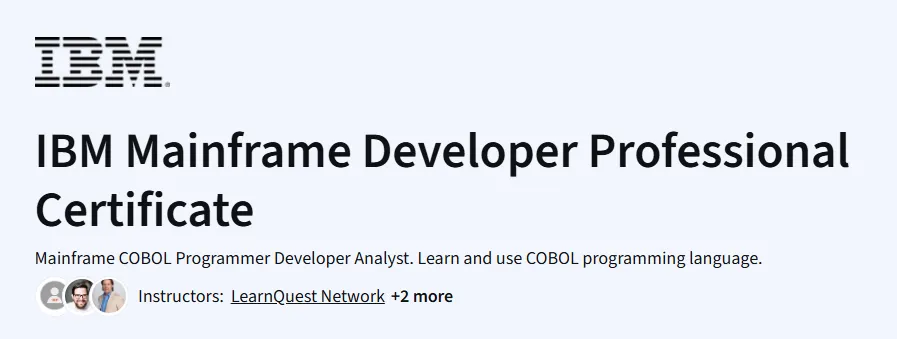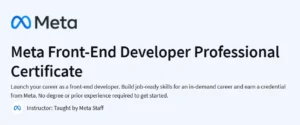What will you learn in IBM Mainframe Developer Professional Certificate Course
Understand mainframe hardware, architecture, and operating systems.
Gain hands-on experience with COBOL, JCL, VSAM, and TSO/ISPF.
Develop and debug programs on IBM Z Systems using z/OS.
Learn how to use Db2 for managing databases and perform queries.
Build proficiency in mainframe application development and batch processing.
Program Overview
Module 1: Introduction to Enterprise Computing
⏱️ 1 week
Topics: History and evolution of mainframes, enterprise computing basics
Hands-on: Interactive assessments and system simulation
Module 2: Introduction to z/OS and IBM Z
⏱️ 1 week
Topics: IBM Z architecture, z/OS features, workload management
Hands-on: Explore z/OS via visual walkthroughs and command-based labs
Module 3: Getting Started with Mainframe on IBM Z
⏱️ 1 week
Topics: TSO, ISPF, Unix System Services
Hands-on: Use online emulators to practice TSO/ISPF and UNIX commands
Module 4: Introduction to COBOL Programming
⏱️ 2 weeks
Topics: COBOL syntax, file handling, conditionals, loops
Hands-on: Write and run COBOL programs in a virtual lab environment
Module 5: Working with VSAM and JCL
⏱️ 2 weeks
Topics: File structures, cataloging, batch jobs, JCL scripting
Hands-on: Develop VSAM files and submit jobs using JCL
Module 6: Introduction to Db2 on z/OS
⏱️ 2 weeks
Topics: Relational DB concepts, SQL on Db2, host variables in COBOL
Hands-on: Execute Db2 queries, embed SQL in COBOL
Module 7: Final Capstone Project
⏱️ 1 week
Topics: Mainframe application development from start to finish
Hands-on: Build, test, and submit a complete mainframe workflow
Get certificate
Job Outlook
High demand for mainframe professionals in banking, insurance, and government sectors.
Mainframe developers earn between $80K–$130K annually.
Skills in COBOL, JCL, and Db2 are highly valued in legacy system modernization.
Many companies face skill gaps as experienced professionals retire, creating new opportunities.
Specification: IBM Mainframe Developer Professional Certificate
|
FAQs
- No prior mainframe experience is required.
- Basic understanding of programming concepts helps, but the course starts with foundational topics.
- Learners are introduced to mainframe-specific programming languages like COBOL.
- Step-by-step lab exercises guide beginners through coding and development tasks.
- Hands-on practice allows gradual skill-building, even for those new to development.
- The course includes hands-on labs for coding, compiling, and testing mainframe applications.
- Learners work on projects simulating enterprise-level workflows.
- Exercises cover COBOL programming, CICS transactions, and DB2 database integration.
- Guided tasks help learners debug and optimize code in a mainframe environment.
- Practical projects prepare learners for entry-level mainframe developer roles.
- Provides skills relevant for roles like Mainframe Developer, COBOL Programmer, or Application Support.
- Hands-on projects demonstrate applied coding and development expertise.
- The certificate signals competence and commitment to potential employers.
- Knowledge gained supports further learning in advanced mainframe technologies.
- Combining this course with networking or internship experience improves employability.
- Many enterprises still rely on mainframes for mission-critical applications.
- Skills in COBOL, CICS, and DB2 are highly valued in banking, insurance, and large corporations.
- Understanding mainframe development enhances ability to maintain and modernize legacy systems.
- Core development practices taught are transferable to other enterprise technologies.
- Hands-on labs simulate real-world enterprise workflows to ensure practical relevance.
- Estimated completion is around 5–7 months at a part-time pace.
- Weekly commitment of 5–7 hours is sufficient to follow lectures and complete hands-on labs.
- Regular coding practice reinforces understanding of concepts and tools.
- Revisiting exercises or debugging code may require additional time.
- Consistent engagement ensures learners develop practical skills and project-ready mainframe applications.





